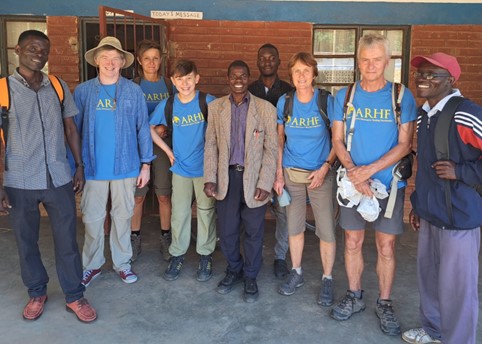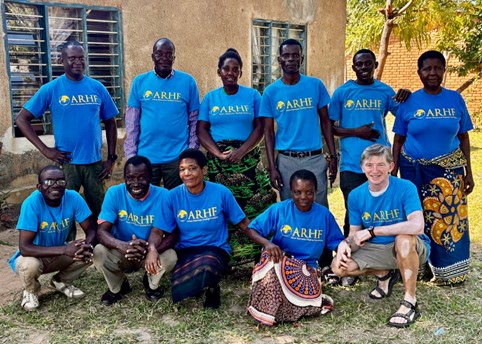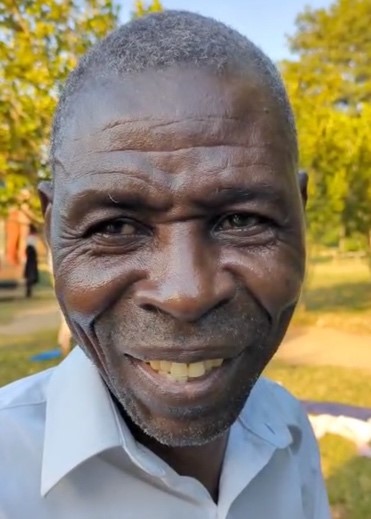The last time we (Bernard and Jo) visited the amma4africa project in Chintheche was back in 2018. Due to the pandemic, we were unable to return until 2025, when we finally traveled with a motivated team of six people. What were our impressions of a changed Malawi?

The Malawian People Are Struggling
The 50% devaluation of the Malawian Kwacha two years ago has deeply impacted millions of people already living on the edge. At times, we even provided financial support to our staff to help them and their families get through difficult periods. Unfortunately, this devaluation appears to be long-lasting, keeping people from improving their lives.
Malawi in September: A New President, A New Beginning?
Many Malawians are disillusioned with the government. Very few regulations seem to benefit the general population. Most of the funding is channeled into big cities and industry, which does little to improve daily life. In fact, the roads are in even worse condition than they were in 2018. Potholes dominate the poorly maintained infrastructure, posing a major challenge for transportation. Roads are essential for boosting the economy and facilitating trade, yet little is being done to address their deterioration. People have little faith that the next president will bring change—political trust is at an all-time low.
Still, many Malawians work tirelessly. Lots of people even make their own bricks to construct homes. Cassava remains a staple in the local diet, along with some leafy greens and rice. Fruit is scarce, aside from delicious bananas and tomatoes. Toward the end of July, papayas will start to provide nourishment, and later in the year, mango trees will drop millions of fruits—far more than anyone can consume.
The next goal of our team is to find ways to integrate classical medicine (with Dr Gryson), PC remedies, and homeopathy to offer the best possible care tailored to each patient. Moving forward, we will place a strong focus on improving communication—through signage, advertisements, a website, Facebook, and other platforms.

Healthcare is Severely Underfunded
Hospitals are chronically neglected and struggle to meet even the most basic needs. We contributed funding to renovate the hospital kitchen, which had been out of use for years due to its deteriorated condition. We also completely replaced mosquito nets in the delivery ward to help keep mosquitoes out. Finally, we helped repair the pathway to the mortuary—a path unfortunately used daily, as the death toll remains high.
While many international organizations are active in Malawi, there is little communication or collaboration between them. They often remain unaware of each other’s work. We’ve recently established four new contacts with organizations from Belgium, the Netherlands, and the United States, providing new opportunities to share and introduce our work.
ARHF: A Healthy Choice for a Better Life
The ARHF homeopathic clinic continues to function well, though some management changes were necessary. After eight years of dedicated service, the ARHF board expressed their gratitude to our clinic manager, Gibson, and appointed Shadreck as the new head of staff. Shadreck has been part of our team since 2012 and has received training in both PC remedies and homeopathy.
He now leads a team of 25 staff members, working alongside Dr. Gryson Kumwenda (hospital director) and Linly Mandota, who coordinates AMPP—our malaria prevention and treatment program. There are 18 volunteers based in Chintheche, and an additional four each in Dwangwa and Zomba. This team was incredibly active in 2024, reaching approximately 140,000 people across Malawi.
Emphasis on PC Remedies
As our team continues outreaches in various towns and villages, PC remedies have proven to be the quickest and most efficient treatment option. Once symptoms are assessed, the process takes very little time. The cost is kept extremely low—just 1,000 MK (around 50 euro cents)—making it accessible to almost everyone. The treatments are simple to follow, and when time permits, homeopathy can be added to the care plan.
People remain hopeful and express deep gratitude for the support and care provided by our dedicated volunteers.
Appeals from Chiefs… But Funding Remains a Challenge
As village chiefs meet and share the positive results their communities have experienced, many reach out to our clinic, requesting a team to be sent—or even to start a new team—in their areas, such as Msimba and Kasungo. We aim to provide a small stipend to our volunteers in recognition of their hard work. Supporting them in this way is a core promise we take seriously.
However, when our budget doesn’t allow for the launch of new teams, we are sometimes forced to say no—something we deeply regret. Still, we remain hopeful that, in the near future, we’ll secure the additional funding needed to expand and strengthen the ARHF teams throughout Malawi.
Malaria and Other Health Challenges
Sadly, malaria remains the most widespread disease we observed during our visit, followed by hypertension, diabetes, seasonal flu, side effects from vaccinations, and various eye conditions. While it’s summer in Europe, Malawi experiences winter during this period—with temperatures around 25°C—which fortunately means fewer mosquitoes and a reduced risk of infection.
During our visits to boarding schools, we noticed a severe lack of mosquito nets—the most basic form of malaria prevention. At around $8 (16,000 MK) each, they’re simply unaffordable for many families. In 2024, we provided about 80 mosquito nets to the Bandawe School for Deaf Children in Chintheche, and we were pleased to see that most of them are still being used.
On a positive note, it seems that the prevalence of HIV/AIDS has declined since 2012—a strong indication that health programs are making an impact.


Stories of Hope & Impact






